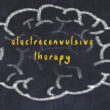A Misunderstood Treatment: Electroconvulsive Therapy
February 7, 2020
To provide relief from certain mental disorders, physicians will sometimes employ electroconvulsive therapy (ECT). This procedure induces mild seizure activity in the patient through the application of electricity in the frontal lobes of the brain. Known in the past as electroshock therapy, ECT is perhaps the most commonly misunderstood and unduly stigmatized psychiatric treatment. This is partially due to scary depictions in movies and other media, but a better viewpoint is that it can be a reasonable treatment alternative for certain mental disorders.
Although ECT was first developed nearly 80 years ago, medical research has proven that it is often the most effective treatment for difficult cases of depression and some cases of bipolar affective disorder and schizophrenia. Allen Frances, M.D., a highly respected psychiatrist and author, says that for some patients, ECT is effective, and “within a few ECT treatments, they’re back to themselves.” Like nearly all medical treatments, ECT does not work in all cases and it can produce some side effects. But Dr. Frances urges that this doesn’t mean that it should be ignored as a healthcare option.
An ECT session only lasts only few minutes, and a usual course of ECT involves treatment two or three times a week for a few weeks, followed by outpatient maintenance therapy. As a treatment option for very severe mental disorders, especially those resistant to other treatment, ECT offers many patients relief from otherwise unrelenting and debilitating psychiatric symptoms. As always, you should talk to your doctor about your specific treatment options. Likewise, you should talk with an experienced Chicago Social Security Disability lawyer to review how your mental health impairments may qualify you for disability. Contact Nash Disability Law today for a free consultation.


